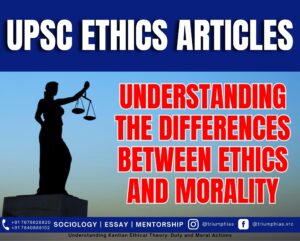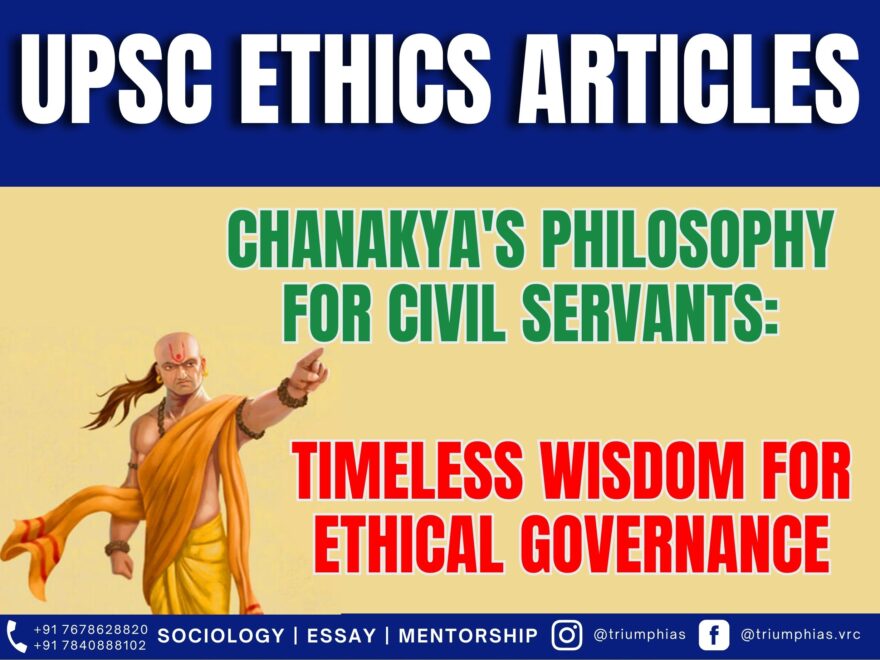Chanakya’s Philosophy for Civil Servant
(Relevant for Ethics, Integrity and Aptitude)

Chanakya’s Philosophy for Civil Servant
Chanakya, an ancient Indian statesman and philosopher, authored a renowned treatise on statecraft known as Artha-shastra. This comprehensive work delves into a wide array of subjects encompassing administration, economics, and ethics. Chanakya’s principles for civil servants can be gleaned from the Artha-shastra and his compilation of aphorisms, Chanakya Niti.
- Dharma (Duty): According to Chanakya, it is the duty of a civil servant to uphold moral principles and act in accordance with justice and righteousness. Their responsibility includes safeguarding the vulnerable, punishing wrongdoers, and promoting the well-being of the populace.
- Loyalty: Chanakya placed great importance on the loyalty of civil servants to their monarch and nation. He stressed that personal interests or external influences should never compromise this loyalty. Civil servants should serve with unwavering honesty, integrity, and devotion.
- Prudence: Chanakya advocated for prudence and wisdom in the actions and decisions of civil servants. They should avoid unnecessary conflicts, wasteful expenditures, and detrimental alliances. Being attuned to changing circumstances and adapting appropriately is also vital.
- Competence: Chanakya underlined the significance of competence in a civil servant’s role. They should possess expertise in their field, with a comprehensive understanding of state laws, policies, and procedures. Effective communication, resource management, and innovative problem-solving are essential skills for them to excel in their responsibilities.
These principles are relevant for the contemporary Indian bureaucracy because they provide a comprehensive framework for good governance and ethical conduct. They can help the civil servants to:
- Serve the public interest and uphold the constitutional values: Chanakya’s teachings provide guidance to Indian civil servants, encouraging them to prioritize the well-being of the populace and uphold fundamental constitutional principles such as democracy, secularism, justice, and equality. They can actively advocate for these values by championing righteousness (Dharma) and taking action against wrongdoing (Adharma), thus contributing to the establishment of a fair and inclusive society.
- Enhance their efficiency and effectiveness: Chanakya’s timeless principles of competence, loyalty, honesty, and diligence remain highly relevant for the modern Indian bureaucracy. Civil servants can elevate their proficiency, maintain unwavering integrity, and deliver high-quality services to citizens by adhering to these principles.
- Deal with complex and dynamic situations: In today’s fast-paced world marked by globalization, technological advancements, cultural diversity, and development challenges, Chanakya’s teachings on strategic thinking, pragmatism, and adaptability are invaluable for contemporary civil servants. These principles equip them to navigate intricate scenarios, seize opportunities, and develop innovative solutions, utilizing a diverse set of tools and methods to achieve their objectives effectively.
- Foster a culture of ethics and morality: By embracing Chanakya’s principles of ethics, morality, and spirituality, civil servants can play a pivotal role in preventing corruption and unethical practices. They can promote virtuous values and principles within their ranks and the broader society, ultimately leading to personal and professional contentment and well-being.
Chanakya’s philosophy for civil servants, which emphasizes ethical governance, efficient resource management, strategic thinking, and continuous learning, holds immense relevance for the contemporary Indian bureaucracy. Incorporating these principles can enhance the effectiveness and integrity of the civil service and contribute to the overall development of the nation.
Sample Question for UPSC Sociology Optional Paper:
- Question: What is the essence of Dharma according to Chanakya’s philosophy for civil servants?
Answer: Dharma, according to Chanakya, involves upholding moral principles and acting in accordance with justice and righteousness. - Question: How does Chanakya view the role of loyalty in civil service?
Answer: Chanakya emphasizes the importance of unwavering loyalty to the monarch and the nation, stating that personal interests should not compromise it. - Question: What are the key competencies that Chanakya believes a civil servant should possess?
Answer: According to Chanakya, competence, effective communication, resource management, and innovative problem-solving are vital skills for a civil servant. - Question: How does Chanakya’s philosophy address the complexities of modern governance?
Answer: Chanakya’s principles of strategic thinking, pragmatism, and adaptability help civil servants navigate complex and dynamic situations in today’s world. -
Question: What role does Chanakya’s teaching play in fostering a culture of ethics within the civil service?
Answer: Chanakya’s principles can prevent corruption and unethical practices by promoting a culture of ethics, morality, and spirituality among civil servants.
Related Blogs …
 |
 |
To master these intricacies and fare well in the Sociology Optional Syllabus, aspiring sociologists might benefit from guidance by the Best Sociology Optional Teacher and participation in the Best Sociology Optional Coaching. These avenues provide comprehensive assistance, ensuring a solid understanding of sociology’s diverse methodologies and techniques.
Chanakya, Chanakya’s philosophy, Dharma and Adharma, Chanakya Niti, Civil Servants, Indian Bureaucracy, Artha-shastra, Ethics, Governance, Duty, Loyalty, Prudence, Competence, Good Governance, Efficiency, Morality, Strategic Thinking, Anti-corruption

Choose The Best Sociology Optional Teacher for IAS Preparation?
At the beginning of the journey for Civil Services Examination preparation, many students face a pivotal decision – selecting their optional subject. Questions such as “which optional subject is the best?” and “which optional subject is the most scoring?” frequently come to mind. Choosing the right optional subject, like choosing the best sociology optional teacher, is a subjective yet vital step that requires a thoughtful decision based on facts. A misstep in this crucial decision can indeed prove disastrous.
Ever since the exam pattern was revamped in 2013, the UPSC has eliminated the need for a second optional subject. Now, candidates have to choose only one optional subject for the UPSC Mains, which has two papers of 250 marks each. One of the compelling choices for many has been the sociology optional. However, it’s strongly advised to decide on your optional subject for mains well ahead of time to get sufficient time to complete the syllabus. After all, most students score similarly in General Studies Papers; it’s the score in the optional subject & essay that contributes significantly to the final selection.
“A sound strategy does not rely solely on the popular
Opinion of toppers or famous YouTubers cum teachers.”
It requires understanding one’s ability, interest, and the relevance of the subject, not just for the exam but also for life in general. Hence, when selecting the best sociology teacher, one must consider the usefulness of sociology optional coaching in General Studies, Essay, and Personality Test.
The choice of the optional subject should be based on objective criteria, such as the nature, scope, and size of the syllabus, uniformity and stability in the question pattern, relevance of the syllabic content in daily life in society, and the availability of study material and guidance. For example, choosing the best sociology optional coaching can ensure access to top-quality study materials and experienced teachers. Always remember, the approach of the UPSC optional subject differs from your academic studies of subjects. Therefore, before settling for sociology optional, you need to analyze the syllabus, previous years’ pattern, subject requirements (be it ideal, visionary, numerical, conceptual theoretical), and your comfort level with the subject.
This decision marks a critical point in your UPSC – CSE journey, potentially determining your success in a career in IAS/Civil Services. Therefore, it’s crucial to choose wisely, whether it’s the optional subject or the best sociology optional teacher. Always base your decision on accurate facts, and never let your emotional biases guide your choices. After all, the search for the best sociology optional coaching is about finding the perfect fit for your unique academic needs and aspirations.
To master these intricacies and fare well in the Sociology Optional Syllabus, aspiring sociologists might benefit from guidance by the Best Sociology Optional Teacher and participation in the Best Sociology Optional Coaching. These avenues provide comprehensive assistance, ensuring a solid understanding of sociology’s diverse methodologies and techniques. Sociology, Social theory, Best Sociology Optional Teacher, Best Sociology Optional Coaching, Sociology Optional Syllabus.
Best Sociology Optional Teacher, Sociology Syllabus, Sociology Optional, Sociology Optional Coaching, Best Sociology Optional Coaching, Best Sociology Teacher, Sociology Course, Sociology Teacher, Sociology Foundation, Sociology Foundation Course, Sociology Optional UPSC, Sociology for IAS,
Follow us :
🔎 https://www.instagram.com/triumphias
🔎https://www.youtube.com/c/TriumphIAS
https://t.me/VikashRanjanSociology
Find More Blogs
|
Scope of the subject and comparison with other social sciences |
|||
|
|
|
|
Modernity and social changes in Europe |

